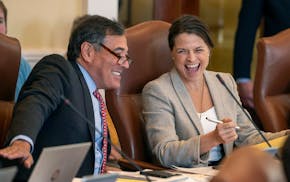LONDON — Barclays, Britain's second largest bank, plans to issue new shares worth 5.8 billion pounds ($8.9 billion) to shore up its capital and satisfy new regulatory requirements meant to prevent a repeat of the 2008 crisis. Its stock price plunged as investors worried dividends would be cut and share value diluted.
The sale of stock to existing shareholders was announced Tuesday along with the bank's first half earnings, and came after the Prudential Regulation Authority told Barclays and other lenders to increase their capital as a buffer against future crises.
Barclays said its leverage ratio — the amount of capital held against total assets —was 2.2 percent compared with the new requirement of 3 percent. That translated to a shortfall in capital of 12.8 billion pounds ($19.6 billion).
"It's not a hole in the balance sheet. It's the product of a series of calculations and adjustments both to the gross side of our balance sheet and our capital," Chief Executive Antony Jenkins told the BBC. "We haven't been trading recklessly. This is the product of a long set of conversations with the PRA."
Investors were jolted by the figures, however, and sent shares in Barclays 6.1 percent lower.
The British regulator has increased pressure on banks to hold more capital at a time when they are also being pushed to lend more to businesses and families to help kick-start the economy, which has been slow to recover from the global economic crisis.
Besides the share issue, Barclays' plan also calls for a reduction in leverage — the amount of debt used to finance investments — and the retention of earnings. That could mean lower dividend payments to shareholders. The bank will also issue 2 billion pounds of bonds that could be easily converted into shares — if the bank gets into trouble.
Jenkins described the move to build more capital as an effort to act prudently. He's been anxious to wrestle to the ground what he described as legacy issues that were created before he was named CEO last August.
Before Jenkins took over and promised the bank would be as ethical as profitable, Barclays was shaken by a string of scandals costing it billions of pounds.
The institution, founded by Quakers and once known for thrift, has been fined by regulators in the U.S. and Britain for manipulating the London interbank offered rate, or LIBOR, the benchmark for trillions of dollars in loans — including some home mortgages. It is also fighting a half-billion dollars in fines for allegedly manipulating electricity prices in California and other western states.
In its earnings statement, which showed net income of 671 million pounds for the first half of 2013 compared with 148 million pounds a year earlier, Barclays said it set aside 2 billion pounds for the mis-selling of payment protection insurance and controversial interest rate swaps.
But Jenkins insisted that the bank was moving in the right direction — despite past issues.
"The important thing is to deal with them in a way that is bold and decisive," he said. "I do think we've made tremendous progress."
Regulators welcomed the bank's actions to increase its capital buffers.
"We have considered all elements of the plan, including new capital issuance, planned dividends and management actions to be taken and, based on Barclays' projections, conclude that it is a credible plan to meet a leverage ratio of 3 percent, after adjustments, by June 2014 without cutting back on lending to the real economy," the PRA said in statement.
Analysts said that Barclays had little choice — it had to meet the new regulatory requirements.
"On a broad level, Barclays is the bad boy of the U.K.," said Ishaq Siddiqi, a market strategist with ETX Capital. "But it's not the only bad boy in the European banking sector."
At the same time, fund managers like Richard Black of Legal & General Investment Management, noted the requirements were much more stringent than anything experienced before in Britain. He said regulators are "trying to go to a gold-plated standard." The new capital would eliminate some uncertainty, he said, but at the expense of dividends.
In the statement Tuesday, the bank also revealed it that the Financial Conduct Authority's gave preliminary findings of a probe over fees paid to four employees under a 2008 fundraising from Qatari investors.
Barclays said it had contested the findings, and that more information would come soon.
Former Wisconsin Democratic Rep. Peter Barca announces new bid for Congress
The Latest | Jury selection enters a pivotal stretch as Trump's hush money trial resumes

